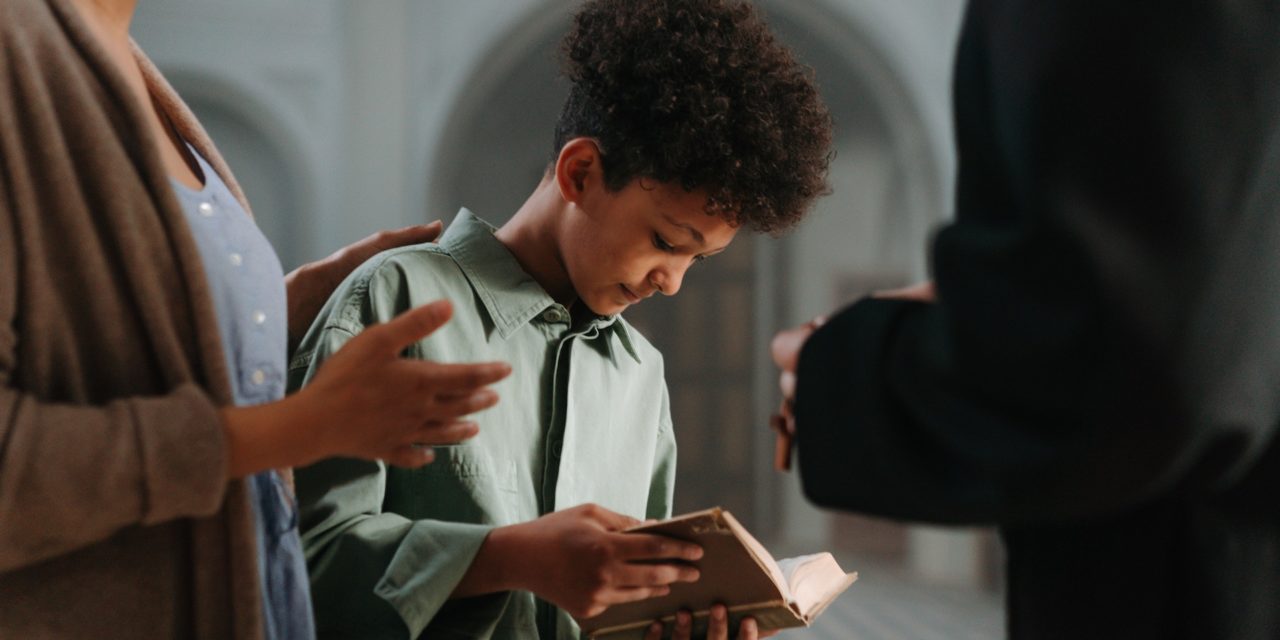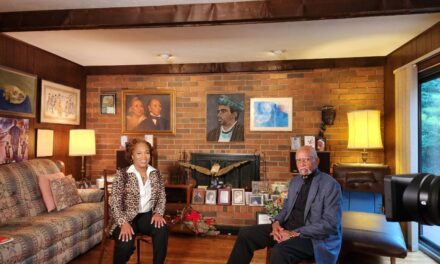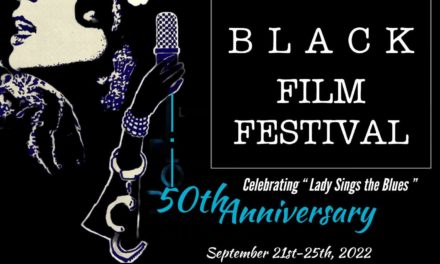This Week on American Black Journal:
“The Black Church in Detroit” Hosts A Roundtable on Youth, Community and Religion
Have today’s youth fallen out of their faith and belief in religion? “American Black Journal” continues its “Black Church in Detroit” series with a look at the Black Church as a center of solutions for the community, especially as it relates to issues surrounding youth.
Host Stephen Henderson sits down with Pastor Ovella Davis of Always in Jesus’ Presence Ministries and Bishop Herman Starks of Christ Truth International Ministries of Deliverance to talk about their work with young people in the community. They talk about how youth feel about God and religion, the importance of making church relevant to them, and how the church can intervene in the cycle of violence involving young people.
Plus, Henderson and the two pastors discuss the role of the Black Church in helping to reduce economic inequality by promoting entrepreneurship, creating mentoring relationships, and encouraging the younger generation to follow their passion and develop their purpose.
Watch Now:
Full Transcript:
Stephen Henderson, Host, American Black Journal: I’m glad to have both of you here because I want to talk about a number of different things. And they’re all things that the both of you spend a lot of time thinking about and actually doing something about in our community. But where I would like to start is with the sort of general idea of young people and the church, and young people in the church in our community.
I think there are a lot of people who worry, I might be one of them, that we’re losing something with each successive generation, that people move further and further, not just from the church itself, but from the idea of community that’s built into the church. At the same time, I say all the time that even though you might not see young people in the pews the way that you used to, they are in places that you can reach them and they are open to the ideas, the same ideas that they would get in the pews. You’ve just got to do the work and you’ve got to kind of reach them where they are.
So, let’s start with that and talk just a little about what you two see when it comes to young people and religion and the church in the black community. Bishop Starks, I’ll start with you.
Bishop Herman Starks, Christ Truth International Ministries of Deliverance: I appreciate it, God bless you. I’m going to take one of the analogies that my good friend Pastor Berry uses, our young folks don’t reject God. They love God. They reject the package. We have to, in the 21st century, have better ways to reach out and to allow our children to see it as a place that they want to come, worship, spend some time and some energy, so that they can learn and glean from us. Because if they are on their own and teach in their self, they can only do it from their concept.
They have no experience, they don’t have knowledge of the world. So, it is not going to necessarily be a good product that’s being produced. I deal, because I have teenagers, so I deal with children all the time and it’s a struggle, it’s a real struggle because I’m older, I’ve lived, so I’ve seen what they haven’t seen. I know what they don’t know.
I know how horrible the world has become in this day and time. They don’t really know that. They see it on TV, but guess what else they see on TV? They see the fun, they see the games, they are on social media. They have a lot of different things that don’t alarm them because they don’t have the same responsibilities that we now have. You know, we take it seriously of making sure that we take care of our children, things of that nature. So, when it comes to the church, typically depending on most churches, we may see young people consistently two, maybe three times a week, right? And typically it’s in some different other capacity, the pastor is busy, the other ministers are busy, unless they do doing the youth program, they just pretty much there and they get bored because my children tell all the time, I’m bored daddy, they just want something else to do, right and I get that.
So, I have to figure out what can I do to ensure that they’re not bored. So, we try to make sure that they handle the door or they pass out some literature when people come into the church and, of late, my daughter’s doing testimony, they’ve been able to give real testimony that wasn’t produced by me. It was produced by them, how they feel about certain things, and that’s important that we have an ear to hear and we receive it so we can be better equipped to know how to aid them and assist them in their dilemma, right, in their situation.
You can’t make it and think that it’s trivial because it’s not, it’s important to them. So, that’s kind of, you know, from a perspective for me. And we have a few young people, we have smaller children, I think my daughter and a few others are like the elder children in the church and it’s real.
Stephen Henderson: Yeah. Yeah, no, that’s a great example of both the tension that exists and ways to kind of break through it. Pastor Davis, what do you see with young people, the young people that you work with in terms of their interest and openness to the idea of being part of the church?
Pastor Ovella Davis, Always in Jesus’ Presence Ministries: First of all, thank you again for this opportunity. And I have to echo Bishop Starks, who echoes Pastor Berry, it’s not God that they reject, it’s the way that God has been packaged, it’s the way that Jesus has been presented. And a lot of religion has placed a lot of laws, thou shall not and judgment and being critical. And so, you know, just like any other person who has maybe sinned or something that’s displeasing in their life, they know when they come to church that they’re already in sin, and so, the last thing they need is to be judged and criticized and beat up again.
What I believe that we should do is help them to understand that Jesus clearly loves you despite your sins. And I have done several interviews with young people because we are a youth-driven ministry, we’re focused on youth. And what is so, just it is constantly unanimously spoken that we don’t want to be judged; we don’t want to be criticized. We don’t want to be judged; we don’t want to be criticized.
And so, I think that that’s a very important place that the church, because we are, if we talking about the church, the 21st-century Postpandemic Church, most of us are older. And so, you know, they see us as old people. And so, when we begin to tell them what we call ethics, morals, standards, you know, that should have transcended time, to them is old fashioned. And so, there is a generation gap, they can’t relate to what we’re saying and they have so many other voices, so many voices speaking to them that they don’t know what’s the truth to follow.
And so, if we are criticizing them, judging them constantly, condemning them for their sins or shortcomings, no, they’re not going to want to be around and come to the church. However, I have found that, I think I’ve found, really a niche, because we have to look at this generation, right? When Jesus was present, he was relevant. He was talking to farmers, so he talked a lot about sowing and reaping, he was relevant to that time.
We’re relevant to this time, whether we like it, love it or lump it, this generation is addicted to attention. They are addicted to attention. And, you know, I mean, we’re no different, we grew up, we just didn’t have the opportunity to have cameras in our face. If we even had a Kodak, we were probably doing well in our day. But this is what we found, and so, creating an opportunity for them to get the attention. And once we let them have the microphone, we give them the platform, we just had a youth explosion Friday where we just let them bring their gifts and we went live.
A camera, a microphone and a stage is what they love. And they brought their friends to see them, you know, present their gifts. So, I think that what we have to do is, we have to look at where we are right now, that we are competing against a lot. But we also need to be wise to say, you know what, when we give them this opportunity to know that they are accepted, and this is another strong point at our ministry, we let everyone know, not just the young people, you are loved, you are accepted, and you are forgiven.
Stephen Henderson: Wow.
Pastor Ovella Davis: And those three things cause them to want to be present. And then once we have, given them the opportunity to be who they are, now we’ve earned the right to be heard. And so, we can kind of share that Jesus, share the ethic, share the moral. So, I say that we just have to look at what we’re dealing with in this last post-pandemic church is what I call it, where they’ve been. They’re on social media, they’re influenced by everything, so we have to compete with that.
Stephen Henderson: Yeah. So, Pastor Davis, that’s a really great opportunity to kind of transition to the next topic that I wanted to talk about, which is the violence that our young people live with and put up with in their lives. It’s been a focus of both of your works. But, Pastor Davis, you’ve come up with a pretty, I think, innovative idea to bring attention to this issue. This “Code 22” program that you have, talk about what that is and how it connects with young people.
Pastor Ovella Davis: Yes, so “Code 22” is really just a code for peace. I think that we have forgotten the consciousness of peace because everything is so violent, there’s so much tension. And another thing I believe that there is, the young people, I think they’re addicted to adrenaline. I think they get an adrenaline rush when they play video games, they get an adrenaline rush when they see the reality TV. So, they’re addicted to it or not even know it. So, when they see the fight and they see all that, they get excited about it.
And so, what we did was we began to talk to the students about peace, what we could do to create peace, and how they can help us. And, you know, their first– I’m talking about our program called Students for Peace, when we went into the schools, we let them know that the 22nd is a no violence day. So, how can you help us make this day a day of peace? And they said it can’t happen.
Nevertheless, we worked on some ideas that came through and this was the amazing thing. So, they came up with, we’re going to wear all white t-shirts on the 22nd, good idea. We’re going to write “Peace” on the chalkboard on the 21st, so when we come in school we’ll remember, it’s peace, okay, right? And if they had a day of no fighting, they would get a pizza party, so this is the reward. Well, the amazing thing was the school principals reported no violence, no fighting, no bullying, no suspensions, and after the 22nd, on the 23rd and the 24th, if the kids saw other students fighting or arguing, they would interfere, say, “Code 22, Code 22!”, which means we don’t do that. So, once they experienced peace, they protected it. And so, that’s what the 22nd is about.
It’s about a peace consciousness, not just for the schools, but for humanity and every person. If we recognize that the 22nd is one day a month, we’re going to focus on creating peace, now we’re creating a consciousness that I believe can infiltrate humanity because I don’t think that there’s anyone that doesn’t want peace. We just don’t know how to obtain it. So, that’s what Code 22 is, it’s a code for peace that asks for every person to take one day and be intentional about promoting peace.
Stephen Henderson: Wow, that’s a really powerful concept. Bishop Starks, I know, you know, over on the east side in particular, Pastor Berry’s church and places like that, is the epicenter really of a lot of the violence that happens in our city. And it’s the young people in that community, and the surrounding communities, who really suffer the most. Talk about the efforts to intervene, right? And the opportunities for the church to intervene in that cycle, to say, we don’t have to live with this, you don’t have to live with this, there are things that we can do differently that will produce different outcomes.
Bishop Herman Starks: I think it’s important from a couple of different perspectives. One is, you have to just be clear in understanding what you are up against. Pastor Berry, myself, we both are from that neighborhood, I grew up right up the street on Chene and Larned. So, I’ve been in that environment my entire life. I really understand the environment, understand the people and understand the concepts, right? So, one of the things that Pastor Berry got right, was that he went and created a relationship. See, that’s very important, it’s creating a relationship, no different than you doing business, you doing anything that you do, you create a relationship. You leave a marker where people begin to understand that they can value you in some form, some fashion. Now, we, I think, as opposed to most people, we get it honestly, because we Pastors. So, most people, there’s a trust factor there because we’re pastors. That’s a start.
So, when Pastor Berry, in his 20-plus years in the environment, reached out and created the relationships, he started something. He allows them to come into the space, into the church to play basketball. Now, you know they came in rowdy and how they do. They came from the neighborhoods, they came with what they had. But once they got in, he had a team of people that could help them, that he had some real-life stories that went to the NBA or went to college, and these mentors began to talk to them and interact with them on an everyday basis and found that some of them needed food in their homes, some of them needed just love and support because he was being beaten and all these other different things that happen.
And these little children, when they come in, we looking at, he’s this bad, he just– but we don’t know what caused it, right. So, in the process of what we did, we began to become social workers, right? We become psychologists, even though we’re not trained in that specifically, but we are trained in the word, we are trained to love, we are trained to help bring about some type of healing process. And then, we began to teach them.
Once they trust us, they come to church and they begin to listen to the word and we bring it in a manner in which they can receive it. I worked in a law firm and I had to interact with some people, you know, from the streets, etc. But I had to break it down to make sure that they understood what the lawyer was trying to tell them. But I also had to tell the lawyer what they were saying that you needed to hear in order for you to have the right analysis, you need to understand what they are saying, right? And so, the two have to come to agree. We have to come to an agreement with our youth, with our young people, because we have to understand them. We have our dear sister, Pastor Ovella Davis, she’s in the school producing a change in these kids where they are policing themselves. So, we ain’t got to do that; we can stand back.
See, once we stand back and allow them to come to us, that’s a better way to react. Because if we go to them, you’re going to get a different response. And so, to your question, Stephen, is that we led with love. We came with the understanding that we are going to have to do a lot of work. We’ve got to micro-manage, we’ve got to be psychologists, we got to be social workers, sometimes we got to be parents to children that don’t have parents. So, I’ve had children that I had to get up out my bed at 2, 3:00 in the morning and go pick them up, and just say, well you come home with me because I ain’t taking where that I don’t know nothing about, you just come with me. And my wife was like, what do you—? Look, we got to take them in. We’ll figure it out tomorrow, but tonight you just here, here go a bed, here go some cover you, you hungry?
Stephen Henderson: This is what you need today.
Bishop Herman Starks: This is what we have to do. And a lot of times we’ve got to the point where some of us are afraid. You cannot be afraid to do this work in the gospel. You just have to do it. You can’t think about all that other stuff because if you start thinking and all that, your mind is going to tell you not to do it. All these safety protocols are gonna be in place. And I know I’m not knocking that, but I’m just saying, when your heart is being pricked, when you are called, we justify. So, we just have to go.
Stephen Henderson: Wow. So, I want to spend the rest of the time talking a little about another issue that connects really closely with our youth, and that’s economic opportunity and economic inequality. Of course, a lot of the things that we see going on with young kids is about the gaps in opportunity that exist. And Bishop Starks, I know that you guys are really focused on that, and not just focused on opportunity, but independent opportunity, I think that’s really important. Talk about how you get youth to a different space, an independent economic space.
Bishop Herman Starks: Well, it’s multifold, but of course, we’ve all seen the little girl on TV selling Kool-Aid or iced tea, you know, in the summertime. We’ve seen our little boys selling hot dogs, selling water, right? We’ve seen that, so we know that they have the ability to sell. They have the ability to want to create some type of income so that they can get them some uniforms, so that they can go on a trip.
So they understood, you know, with the support of adults, they understood that these are plausible things. So what we do, Church of the Messiah has set the model, and what we’re doing is grabbing that same model and taking it through all our pastors and say, hey, look, we can help our children by making sure or ensuring that we are the incubators, right, that we can create them and show them how to do what it is that they want to do. And sometimes they might do two or three or four things, that’s okay.
Because if I can replace, in your hand an opportunity and you will set the gun down, or you will set the screwdriver down from taking a car or whatever, you know, putting yourself in harm’s way and putting somebody else in harm’s way, if I can replace that with an opportunity, then the opportunity becomes a catalyst for change. We have to always remember we are still talking about children. We talking about young folks.
I think the statistics say that the brain doesn’t mature until 26 years old. So, we are still dealing with immature individuals that we want to just punish, no you can’t do that, no different than if you’re a parent you understand, you spank your child to let them know that you cannot stick your hand in the plug because you might die. We know what they don’t know. You don’t beat them, but you spank them to alert them that this is not something that you should continue to do, and you might have to do it two or three times. And they’d be like, well, you know what, I’m just going to leave that alone and go do something else.
Stephen Henderson: They figure it out, yeah.
Bishop Herman Starks: They figure it out. So, here’s children that have never had these opportunities in life. Nobody ever brought them these things. This is what, we as the church, are coming together to say, we’re going to help you become better. We’re going to help you find out who you are. We are going to give you a platform. We’re going to hug you, love on you, and help you begin to achieve goals that you can set for yourself. Not that we set, but that you set.
Stephen Henderson: So that they can own it. Pastor Davis, that reminds me so much of what you were talking about with Code 22, that you came up with this framework and this idea and the kids took it themselves and made it their own and built it into something that maybe you never thought it would become. That is the model for the economic opportunity that they need as well.
Pastor Ovella Davis: Yeah, and that’s exactly right. You know, our young people are absolutely brilliant. I’m so amazed when I sit down and talk to them. I remember when I went into Ecorse high school with Students for Peace, and there was this young African-American male, hair all over the place, hoodie on, you know, walking down the hall, not in class. And the principal told me, I want to put him on your coaching. And I’m looking and I’m like, okay, fine. And he came in and after I began to have conversations with him, his level of intelligence, the problem was that he was intelligent beyond what teachers could understand.
And he didn’t see a reason to be in class because of his knowledge, and so what he did, he became one of the leaders of the Code 22 program. He was one of the implementers, just skip in class. And so, I think one of the things that we really have to do, and I’m a certified purpose development coach also, so I teach purpose development because one of the things that I think is lacking in our youth is that they do not know that they have been created with a purpose.
There is a divine design that was placed within each of us and it is greatness, there’s no limit to it. So, I talk to them about what is your passion. What do you love so much that if you never got paid to do it, you’d still want to do that thing? And I allow them to tell me about their passions. And so, then I talk to them, okay, so since you love this, how could we monetize this? Like who wants what you do? Some of them like to cook, and I began to get them to think in the process of an entrepreneur. And that’s what I think is so important, because the world system is governed in a way, I mean, be honest, it’s not set up for them to succeed in that 40-hour week programs. But we’re living in an amazing time with what social media and they’ve learned how to monetize.
It was one young lady, who’s now my goddaughter, she’s just the cutest little thing and I love makeup and she would always wear eyelashes. And I said, you’re always putting on these different eyelashes, they look like they could dust the whole house, they go up to her eyebrows, that’s what they wear on these days. But I said, If you love this so much, then why don’t you find out how to buy them wholesale? You make fliers and retail them. So, she came up with her own idea called “Classy Lash Palace”, and she began to sell eyelashes online because they know all about that. Then she was a graduate of 22, she actually had lashes that had the little number 22 on the end of the lashes, and she got them in colors that the young ladies, it could match their prom dresses. So, she took what she was passionate about, I just gave her an idea about being an entrepreneur, and she took it, and ran with it, and made it something greater.
So, I think that this is really important when we talk about economics, for them to understand that they have a purpose, help them to discover that passion which will lead them to their purpose, and then show them a path to help them to maybe think about how you can monetize what it is that you love. And I’m totally for education, college, and all the things that we can do to help them to have an advantage. But I think that this self-worth, when they understand that they are valuable, that they have a purpose, I watched them light up. Most of them have been beat down. They’ve come from a community that lets them know that their failures, you’re just like your dad, and we speak something different. And when we talk about purpose, it’s a game changer.
Stay Connected:
Subscribe to Detroit Public Television’s YouTube Channel & Don’t miss American Black Journal on Tuesday at 7:30 p.m and Sunday at 9:30 a.m. on Detroit Public TV, WTVS-Channel 56.
Catch the daily conversations on our website, Facebook, Twitter and Instagram @amblackjournal.
View Past Episodes >
Watch American Black Journal on Tuesday at 7:30 p.m. and Sunday at 9:30 a.m. on Detroit Public TV, WTVS-Channel 56.





